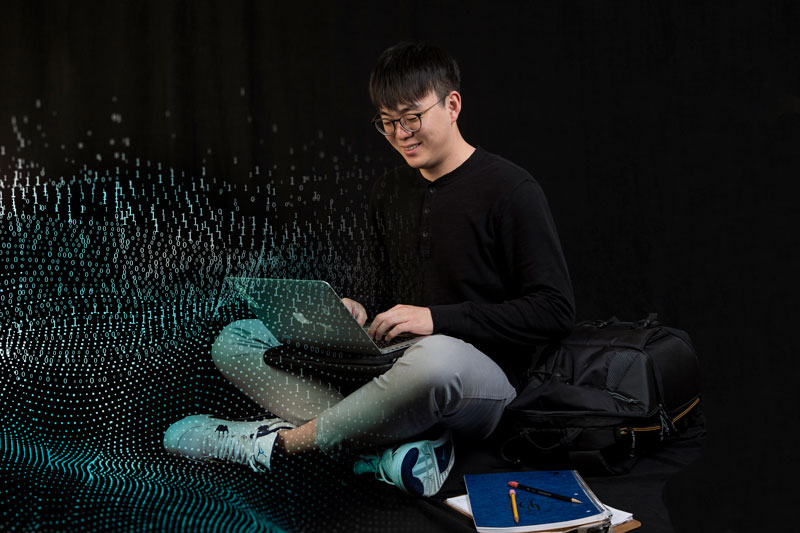


Driven to Discover: Zizhuo Xu
Photo by Kathy F. Atkinson | Photo illustration by Jeffrey C. Chase August 26, 2019
Summer Scholar uses data analytics in study of Delaware water resources
Editor’s note: Research, community service, internships and study abroad are part of the summer for University of Delaware students. Follow them in action in our series of profiles and stories, which will be collected on the Driven to Discover website.
Zizhuo Xu, a senior statistics major in the College of Agriculture and Natural Resources, is one of more than 500 students doing research across UD this summer. He is a native of Henan Province, China.
Q. What are you studying and with whom?
Zizhuo: I am studying machine learning and big data analytics techniques with Dr. Shanshan Ding, assistant professor of applied economics and statistics.
Q. What is it about this topic that interests you?
Zizhuo: In Delaware, threats to water security relate primarily to water quality and arise largely due to human behavior. The way to improve water security is fundamentally by making better decisions. The most interesting part for me is that I can use my abilities to analyze water resource data and human behavioral data collected through experiments and the Delaware ESPCoR program to help other scholars make better decisions to improve Delaware’s water security.
Q. What is a typical day like?
Zizhuo: Since I am going to apply for a master’s degree, I need to work on both the internship and preparing for the GRE test. Usually, I work seven days a week. I spend five or six hours learning new information through videos and articles. This allows me to review the information I have learned in college and many new things about R and Python languages (programming languages), machine learning and big data analytics techniques. I also spend three or four hours preparing for the GRE.
Q. What is the coolest thing you’ve gotten to do on the project?
Zizhuo: The coolest thing is I can help to address problems in society through my own abilities. As a student, I hope to use my knowledge to make the world better and earn a salary. This internship gives me the opportunity to work with Dr. Ding and to study advanced statistical modeling and machine learning methods to potentially help improve water security in Delaware. It makes me proud of myself.
Q. What has surprised you most about your experience?
Zizhuo: Before I worked with Dr. Ding on this topic, I was only eager to broaden my knowledge and skill set. I never imagined this internship could be a benefit to Delaware’s water security. Also, I am surprised that I have the opportunity to learn one of the most cutting-edge technologies of statistics in this internship.
Q. What hurdles have you had to overcome while doing this work?
Zizhuo: Communication in one of them. How to communicate with my professor more effectively is an important hurdle for me. It’s important to have a summary showing what you did this week, what your questions are this week and what your plan is for the next step. I need to send this summary to my professor before we meet to more efficiently solve problems and to get more helpful advice and suggestions from the professor. At the beginning, I didn’t do this and the process was slow. Now everything works better.
There are scientific hurdles, too. According to the objectives of my project, there are several steps to do and each step takes time and energy to solve. I must find the best method to achieve my goal, learn the details of each method and learn how to use software to implement the methods. Finally, when I face unexpected computing issues, I must look through every detail about the computer code to find if there is any mistake in order to improve results.
There are other hurdles, too, including: working independently, planning and time management, understanding scientific terms and applying research tools and techniques in real applications.
Q. Dreaming big, where do you hope this work could lead?
Zizhuo: Water security challenges exist not only in Delaware, but also around the world. I really hope this work can be useful for understanding and solving water security issues around the world, which can greatly improve people's lives.
Q. If you had to summarize your experience in only one word, what would it be?
Zizhuo: Advance.
Q. What advice would you give younger students (middle/high school) with similar interests?
Zizhuo: I could give advice to younger students about learning computer software easily, communicating with professors more effectively and what you can do with a statistics major. In addition to these perspectives, it is more important to find the best way to learn new information. Life is a learning process. As information technology develops rapidly, people should keep learning and updating knowledge in their life. I think when you are studying in middle or high school, finding an effective way to study new information is more important than only getting a good grade.
It is important to summarize what you learned periodically and try to figure out how to study easier and faster. You will face more complex and difficult problems when you are in college and in society. If you have a better way to study, you can utilize time more efficiently and get better outcomes than other people do. You can also have more time to do your own favorite things. So finding a better way to study, to me, is the most important advice.
Q. What do you enjoy when you are not doing this kind of work?
Zizhuo: I enjoy playing basketball, walking with my corgi and watching movies. I just watched the movie “Spider-Man: Far From Home.” It’s awesome.
Contact Us
Have a UDaily story idea?
Contact us at ocm@udel.edu
Members of the press
Contact us at mediarelations@udel.edu or visit the Media Relations website

